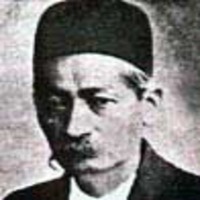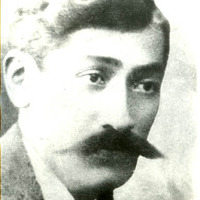Darvish Khan
(1871-1926)Darvish Khan (1871-1926). Tar and setar instrumentalist and one of the most eminent masters of Persian classical music in the last fifty years of the Qajar period, regarded among musicians as an artist who had an indisputable influence on later generations. An eminent student of the two great maestros of the Qajar period, Mirza ‘Abdu’llah and Mirza Husayn Quli, he studied at the music school of Dar al-Funun where he gained some slight acquaintance with European music. Recognized as an authority in Persian classical music in his youth, he was also an avant-garde musician in the milieu of intellectual movements in the era of Constitutional Revolution. He was one of the earliest musicians who made recordings on gramophone records.
Besides his legendary skills in performing on the tar and setar, he is of renown in the history of music for two significant characteristics: 1) the creation and development of pishdaramad (“preamble” or “overture”) form in Persian music of early twentieth century, and 2) the composition of quite exquisite pieces within the forms of the pishdaramad, tasnif (‘popular ballad’ ), and ring (a fast tempo piece similar to a waltz). His compositions possess artistic perfection, and sophisticated aesthetic refinement which together combine to make a profound emotional impression on the listener. The extraordinary spiritual ecstasy that characterized his performances sprang from his keen interest in mysticism and his disciplic affliliation to the Sufi Order of Safi ‘Ali Shah, whose khanaqah (Sufi meeting house) he frequented and which fostered and brought his exquisite spiritual talent to fruition. Darvish Khan is regarded as an Iranian musician par excellence who was also a Sufi adept possessed of true spiritual realization. Perhaps because of this eminent musicians like Ruhu’llah Khaliqi and Javad Ma‘rufi were attracted to his compositions which they adjusted for performance by the great orchestras of his day.
Later on, Darvish Khan’s works were selected and remixed for performance in the Gulha programmes, partially as a result of the participation and recommendation of two other musicians in them: ‘Abdu’llah Davami (as consultant) and Abu’l-Hasan Saba (both as consultant and producer). Davami was a friend and colleague of Darvish Khan’s, and Musa Ma‘rufi and Saba were two of Darvish Khan’s outstanding students. Both of the latter were also amongst the transmitters of Darvish Khan’s oeuvre to the Gulha, through which the great master’s compositions were presented to Persians and thus preserved for posterity. A collection of his works was collected with their full musical notation performed on the tar by Arshad Tahmasbi (1985-) in the years 1980-90 (published Tehran: Mahur 1988-2001).



 In association with The Iran Heritage Foundation © All rights reserved 2025. Jane Lewisohn | Website by
In association with The Iran Heritage Foundation © All rights reserved 2025. Jane Lewisohn | Website by